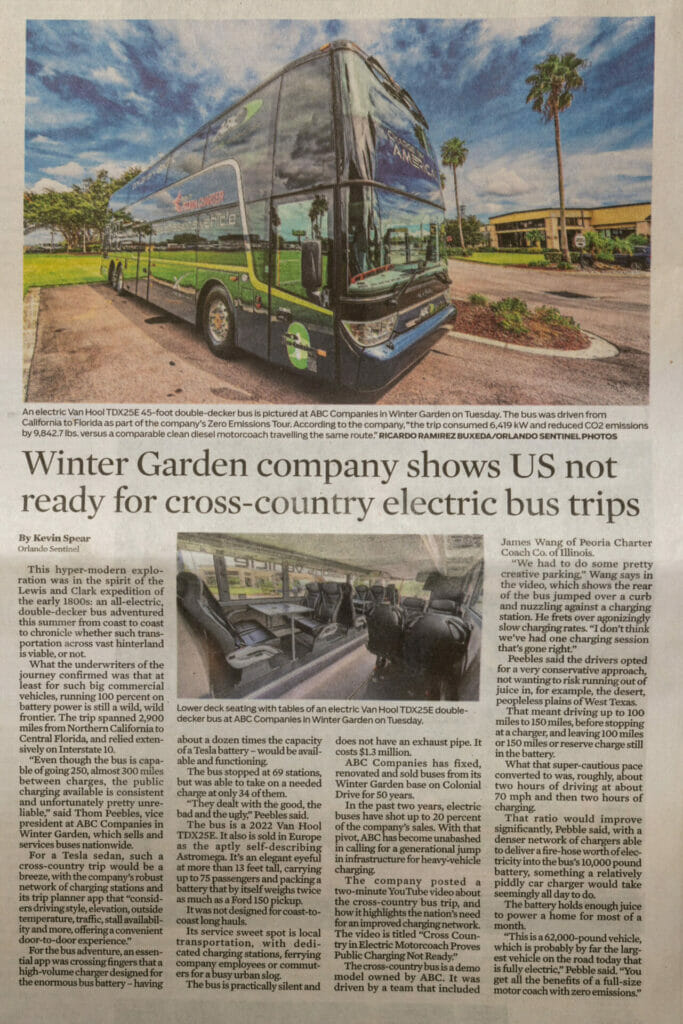Orlando Sentinel: Winter Garden company shows US not ready for cross-country electric bus trips.
- September 5, 2023
- Uncategorized
- Posted by Chase Peebles
- Comments Off on Orlando Sentinel: Winter Garden company shows US not ready for cross-country electric bus trips.
This hyper-modern exploration was in the spirit of the Lewis and Clark expedition of the early 1800s: an all electric, double-decker bus adventured this summer from coast to coast to chronicle whether such transportation across vast hinterland is viable, or not.
What the underwriters of the journey confirmed was that at least for such big commercial vehicles, running 100 percent on battery power is still a wild, wild frontier. The trip spanned 2,900 miles from Northern California to Central Florida, and relied extensively on Interstate 10.
“Even though the bus is capable of going 250, almost 300 miles between charges, the public charging available is inconsistent and unfortunately pretty unreliable,” said Thom Peebles, vice president of Marketing at ABC Companies in Winter Garden, which sells and services buses nationwide.
For a Tesla sedan, such a cross-country trip would be a breeze, with the company’s robust network of charging stations and its trip planner app that “considers driving style, elevation, outside temperature, traffic, stall availability and more, offering a convenient door-to-door experience.”
For the bus adventure, an essential app was crossing fingers that a high-volume charger designed for the enormous bus battery – having about a dozen times the capacity of a Tesla battery – would be available and functioning.
The bus stopped at 69 stations, but was able to take on a needed charge at only 34 of them.
“They dealt with the good, the bad and the ugly” Peebles said.
The bus is a 2022 Van Hool TDX25E. It also is sold in Europe as the aptly self-describing Astromega. It’s an elegant eyeful at more than 13 feet tall, carrying up to 75 passengers and packing a battery that by itself weighs twice as much as a Ford F150 pickup.
It was not designed for coast-to-coast long hauls.
Its service sweet spot is local transportation, with dedicated charging stations, ferrying company employees or commuters for a busy urban slog.
The bus is practically silent and does not have an exhaust pipe. It costs $1.3 million.
ABC Companies has fixed, renovated and sold buses from its Winter Garden base on Colonial Drive for 50 years.
In the past two years, electric buses have shot up to 20 percent of the company’s sales. With that pivot, ABC has become unabashed in calling for a generational jump in infrastructure for heavy-vehicle charging.
The company posted a two-minute YouTube video about the cross-country bus trip, and how it highlights the nation’s need for an improved charging network. The video is titled “Cross Country in Electric Motorcoach Proves Public Charging Not Ready.”
The cross-country bus is a demo model owned by ABC. It was driven by a team that included James Wang of Peoria Charter Coach Co. of Illinois.
“We had to do some pretty creative parking.” Wang says in the video, which shows the rear of the bus jumped over a curb and nuzzling against a charging station. He frets over agonizingly slow charging rates. “I don’t think we’ve had one charging session that’s gone right.”
Peebles said the drivers opted for a very conservative approach, not wanting to risk running out of juice in, for example, the desert, peopleless plains of West Texas.
That meant driving up to 100 miles to 150 miles, before stopping at a charger, and leaving 100 miles or 150 miles or reserve charge still in the battery.
What that super-cautious pace converted to was, roughly, about two hours of driving at about 70 mph and then two hours of charging.
That ratio would improve significantly, Peebles said, with a denser network of chargers able to deliver a fire-hose worth of electricity into the bus’s 10,000 pound battery, something a relatively piddly car charger would take seemingly all day to do.
The battery holds enough juice to power a home for most of a month.
“This is a 62,000-pound vehicle, which is probably by far the largest vehicle on the road today that is fully electric,” Peebles said. “You get all the benefits of a full-size motor coach with zero emissions.”
Credit: Orlando Sentinel


